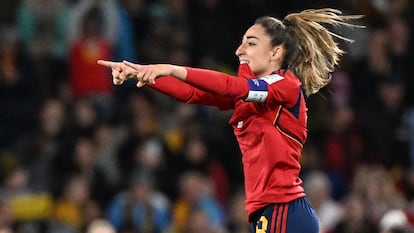In the eye of the storm, Spain’s World Cup champions just want to get the ball rolling again
Between tributes and celebrations for their historic triumph in Australia, the 23 members of La Roja’s squad seek a return to normality amid the Luis Rubiales case

The greatest triumph in soccer, the World Cup, placed them under the spotlight. But their exposure has now reached a level that is difficult to bear because of a controversy, and a kiss, that they did not want or provoke, and which has made them the focus of a worldwide debate in a panorama that appears muddier by the minute and shows few signs of being swiftly resolved. The 23 players on the Spain national women’s team have seen celebrations for their achievement overshadowed by scrutiny and uncomfortable questions about the Luis Rubiales case. For La Roja, the post-World Cup hangover has been very different than anticipated.
“We want our profession to be respected; we are simply fighting for that,” Ballon d’Or holder Alexia Putellas said in an interview with former soccer player Marc Crosas. “We want more facilities and better infrastructure to help us do our job well, and for executives and institutions that fight for that so we can concentrate on soccer,” said the Barcelona star.
In Seville, the famous Torre del Oro was lit up with the faces of Olga Carmona, scorer of the winning goal in the final against England, and Irene Guerrero. A succession of tributes in the towns or cities where the champions were born have been held. The premier of the regional government of the Balearic Islands, Marga Prohens, held a ceremony with Cata Coll and Mariona Caldentey, who she told: “You are the living history of the Islands and a reference for thousands of girls.” In Pontevedra, Rafael Louzán, the president of the Galician Football Federation, told Teresa Abelleira: “In Galicia there are already 12,000 girls playing soccer and there are going to be many more.”
“We have to take into account that a drastic change of role has been imposed on them. They went from being known in soccer to being known at a general public level. Those feelings of becoming a benchmark come with a responsibility,” says María Aguirre, a sports psychologist who works with several players, including Carmona and Athenea del Castillo. She accompanied both at the World Cup. “They are elite athletes and they are prepared to handle the situation, but it is worth investing time in re-evaluating who they are, where they are going, and who they want to be for others as well as for themselves. It’s as if a new identity is being created and it has to be generated from the success achieved,” she explains.
“They are pioneers because they have won more than just a World Cup, but now they have the challenge of managing this situation and continuing to compete,” says Diego Segura, a sports psychologist and former professional player with Spanish clubs Betis, Alavés, Ceuta, and Cartagena. Spain’s triumph in Australia was a giant step in terms of promoting respect and the value of women’s soccer, but there is still a huge amount of ground to cover. “Some players will go from full stadiums and television audiences of millions to playing matches with less impact on municipal fields. That change has to be managed,” says Segura, who stresses the importance of the champions continuing on the same path as before and surrounding themselves with the people who have always valued them. “They must return to normality as soon as possible, enjoy and take advantage of the good things but be aware that there will be many occasions when they will also have to say no.”

In this new scenario, the players are managing their public engagements carefully. Carmona has been advised to cancel the few interviews she has agreed to. But ambushes can arise at any time. Last Monday, she was honored by the City Council of Seville and journalists were warned: “She will speak only about soccer and will not answer questions about Luis Rubiales.” But that was not the case. “Of course I support Jenni [Hermoso], I said so in a tweet, but I do not want to make further comments,” she clarified. Shortly after, she agreed to answer two questions from a television channel. From the studio, the anchor announced statements from Carmona “about Rubiales’ mother,” who has staged a hunger strike in support of the Spanish Football Federation president. In reality, what the player said was that she was focused “on all the good things” that were on the horizon. Her conclusion seemed to be a call for the ball to come to the rescue: “I’ll start training soon.”
That return has to be managed as well, says Aguirre. “They achieved a goal and now there may be a feeling of emptiness. That’s why you have to reconnect and to avoid burnout syndrome the most important thing is to have the necessary time to disconnect”
The players are in the eye of a storm that should never have involved them and threats and insults have begun to sprout on social networks. “The players have to protect themselves and distance themselves from social media, to have a more real life,” Segura says. Aguirre concurs: “They must regulate their exposure on the networks, protect privacy and avoid issues unrelated to soccer because they are very vulnerable and with emotions on the surface.” Success generates desired and undesired consequences. It can change lives. “You have to manage it. And the key is to remember what they do: they are soccer players,” says Aguirre. That’s why Carmona, like everyone else, just wants to get the ball rolling again.
Sign up for our weekly newsletter to get more English-language news coverage from EL PAÍS USA Edition
Tu suscripción se está usando en otro dispositivo
¿Quieres añadir otro usuario a tu suscripción?
Si continúas leyendo en este dispositivo, no se podrá leer en el otro.
FlechaTu suscripción se está usando en otro dispositivo y solo puedes acceder a EL PAÍS desde un dispositivo a la vez.
Si quieres compartir tu cuenta, cambia tu suscripción a la modalidad Premium, así podrás añadir otro usuario. Cada uno accederá con su propia cuenta de email, lo que os permitirá personalizar vuestra experiencia en EL PAÍS.
¿Tienes una suscripción de empresa? Accede aquí para contratar más cuentas.
En el caso de no saber quién está usando tu cuenta, te recomendamos cambiar tu contraseña aquí.
Si decides continuar compartiendo tu cuenta, este mensaje se mostrará en tu dispositivo y en el de la otra persona que está usando tu cuenta de forma indefinida, afectando a tu experiencia de lectura. Puedes consultar aquí los términos y condiciones de la suscripción digital.








































